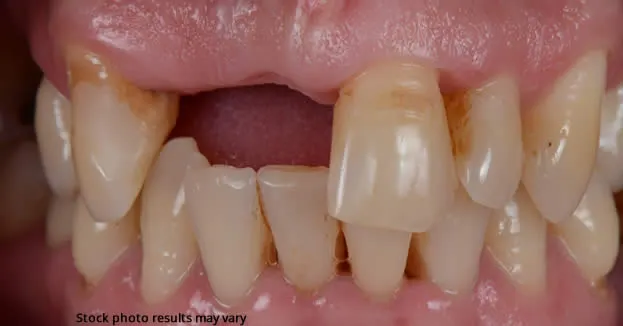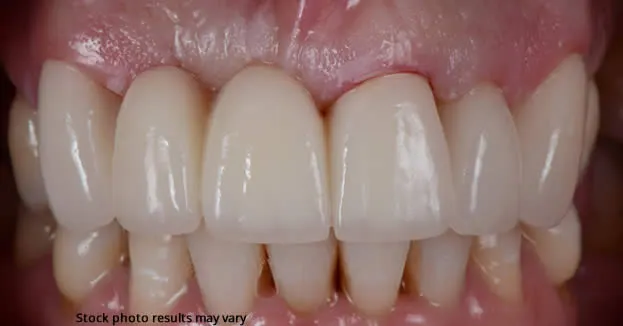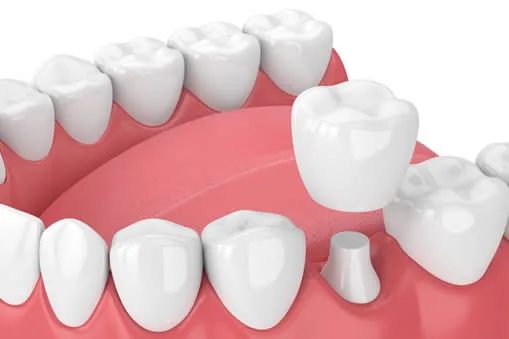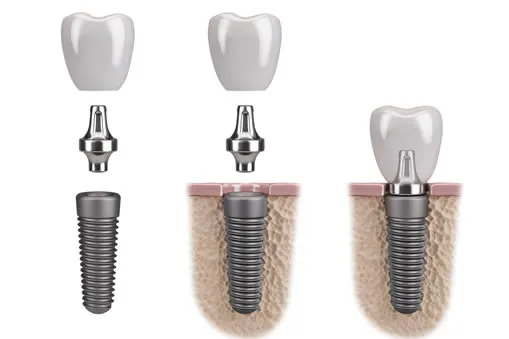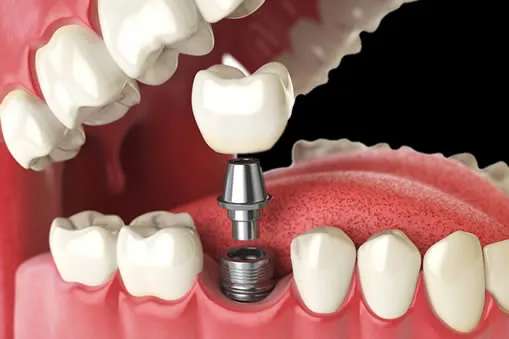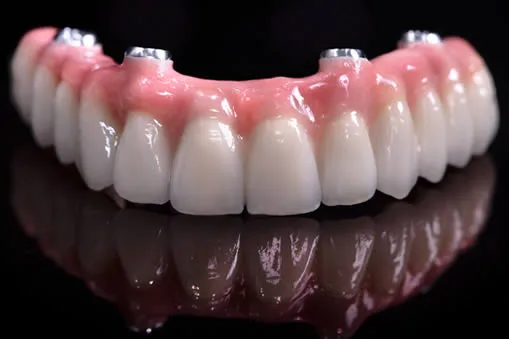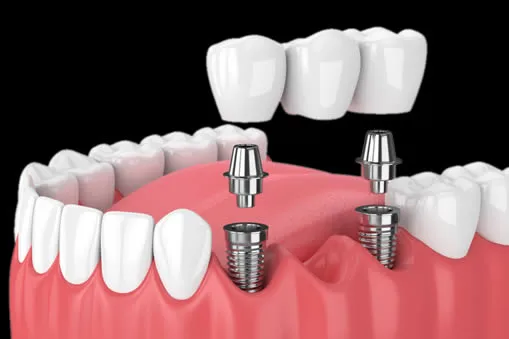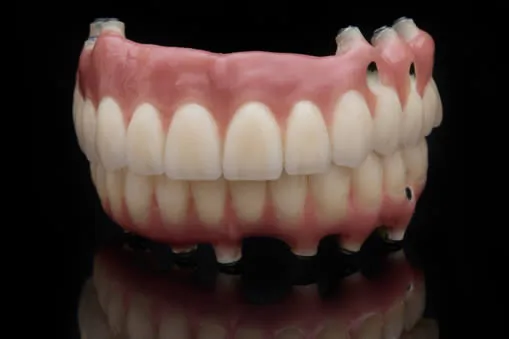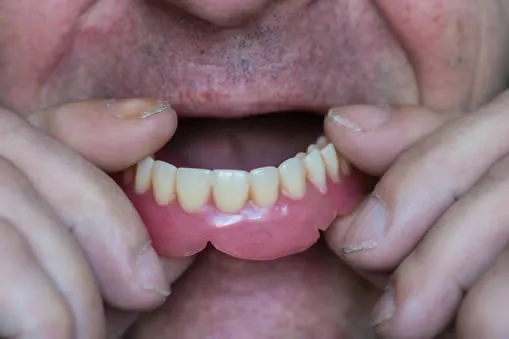Dental Crowns & Bridges
WHY DO YOU NEED A DENTAL CROWN?
In the past, you may have had fillings to repair your teeth therefore you may wonder why you require an onlay or crown this time? Both of these options are an ideal way to restore teeth that have large, old restorations that can’t be repaired. Dental crowns also help to strengthen teeth after root canal therapy. These restorations are also recommended to restore a tooth that has been fractured or extensively damaged by decay in a way that a filling can’t fix.
Crowns are designed to adhere to your remaining tooth structure and cover your tooth like a cap. This allows it to encase the entire tooth, so you can eat, chew, brush, and floss with ease again.
WHY DO YOU NEED A DENTAL BRIDGE?
Missing teeth look unattractive, undermine your self-confidence, and make speaking and chewing uncomfortable. A bridge is a solution for replacing one or multiple missing teeth that are adjacent. It relies on adjacent teeth as anchors for one or more prosthetic teeth in the middle. These teeth support the bridge which will restore the lost function and aesthetics.
There are benefits when choosing a dental bridge such as:
• A bridge is a fixed, long-term solution that can be a better choice for some patients than an appliance that is removable.
• A bridge prevents teeth from drifting into the empty space
• A bridge is a great alternative when we can’t utilize a dental implant.
What Types of Dental Bridges Are Available?
Dental crowns generally have a uniform structure, but the various types of dental bridges exhibit distinct variations in their structure. At present, four different types of dental bridges are available: traditional, cantilever, Maryland, and implant-supported. The traditional dental bridge is composed of two dental crowns utilized as anchors with a fake tooth or teeth placed in the middle, making it one of the most widely used types of dental bridges. Similarly, a cantilever bridge utilizes an anchor crown only on one adjacent tooth to the missing tooth. Due to the potential excessive strain on the anchor tooth, cantilever bridges are usually not recommended, although they may be necessary towards the back of the mouth. A Maryland dental bridge, like a traditional dental bridge, employs the same structure, but instead of dental crowns, it employs a metal framework attached to the backs of the two teeth on either side of the gap. Finally, an implant-supported dental bridge is identical in structure to a traditional bridge, but with dental implants serving as the anchor teeth.
What Types of Dental Crowns Are Available?
Although the structure of dental crowns remains consistent, the materials used to make them can vary significantly. Dental crowns are typically made from stainless steel, metal, porcelain fused to metal, all-resin, or all-ceramic/all-porcelain materials. Stainless steel crowns are commonly used in children on baby teeth or as temporary crowns, while metal crowns made from gold, platinum, or base metal alloys are a more common choice for permanent crowns. Porcelain fused to metal (PFM) crowns feature a metal base with a ceramic exterior, which provides both strength and a natural appearance. All-resin crowns are made from dental composite resin and can be color-matched to your teeth, while all-ceramic/all-porcelain crowns offer a stronger alternative to all-resin and can also be matched to the natural color of your teeth.
How Is a Dental Crown or Bridge Placed
Placing a dental crown or bridge requires two appointments. During the initial appointment, dental impressions will be taken, and your tooth or teeth will be prepared. Dental impressions are critical in creating a mold of your mouth that will be sent to a dental laboratory. The dental laboratory will use this information to create a custom-made dental crown or bridge. Your tooth or teeth will also need to be prepared for the placement of a crown or bridge. To accomplish this, your mouth will first be numbed to ensure your comfort. The decayed tissue is then removed, and the remaining tissue is reshaped. This process will need to be repeated for each tooth that is receiving a dental crown. Once the tooth is shaped, a temporary crown or bridge will be installed to protect the teeth while the permanent restoration is being fabricated.
Upon completion of the permanent restoration, you will return to our office for a second appointment. During this second visit, the temporary crown or bridge will be removed, and your teeth will be cleaned before placing the permanent restoration.
ADDITIONAL FREQUENTLY ASKED QUESTIONS ABOUT DENTAL CROWNS AND BRIDGES
How long do dental crowns last?
The lifespan of dental crowns varies depending on the material used, proper care, and oral hygiene. Generally, dental crowns can last between 5 to 15 years or longer.
How long do dental bridges last?
With proper care, dental bridges can last up to 10 to 15 years or more, depending on the type of bridge, the materials used, and the patient’s oral hygiene habits.
How do I care for my dental crown or bridge?
To care for your dental crown, you should brush twice a day, floss daily, use an antibacterial mouthwash, and visit your dentist regularly for cleanings and check-ups.
Are dental crowns painful to get?
Getting a dental crown typically involves some mild discomfort, but your dentist will administer local anesthesia to numb the area and make the procedure as comfortable as possible.
Can anyone get a dental crown or bridge?
Not everyone is a candidate for a dental crown or bridge. Your dentist will evaluate your oral health and determine if a dental crown is the best treatment option for you.
Is there a dentist near me in Conyers that offers dental crowns and bridges?
Yes. At our Conyers dental office we offer dental crowns and bridges to patients from Conyers and the surrounding area. Contact our office today to schedule an appointment.


